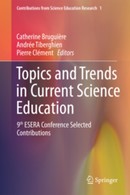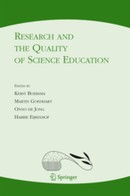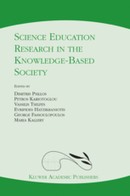Compilations
Publications
Editors: Hahl, K., Juuti, K., Lampiselkä, J., Uitto, A., Lavonen, J. (Eds.)
https://www.springer.com/gp/book/9783319586847
This edited volume brings forth intriguing, novel and innovative research in the field of science education. The chapters in the book deal with a wide variety of topics and research approaches, conducted in various contexts and settings, all adding a strong contribution to knowledge on science teaching and learning. The book is comprised of selected high-quality studies that were presented at the 11th European Science Education Research Association (ESERA) Conference, held in Helsinki, Finland from 31 August to 4 September, 2015. The ESERA science education research community consists of professionals with diverse disciplinary backgrounds from natural sciences to social sciences. This diversity provides a rich understanding of cognitive and affective aspects of science teaching and learning in this volume. The studies in this book will invoke discussion and ignite further interest in finding new ways of doing and researching science education for the future and looking fo
r international partners for both science education and science education research. The twenty-five chapters showcase current orientations of research in science education and are of interest to science teachers, teacher educators and science education researchers around the world with a commitment to evidence-based and forward-looking science teaching and learning.
Editors: Nicos Papadouris, Angela Hadjigeorgiou & Costas Constantinou
https://www.springer.com/gp/book/9783319200736
Explores a broad range of issues within science education
This book includes studies that represent the state of the art in science education research and convey a sense of the variation in educational traditions around the world. The papers are organized into six main sections: science teaching processes, conceptual understanding, reasoning strategies, early years science education, and affective and social aspects of science teaching and learning. The volume features 18 papers, selected from the most outstanding papers presented during the 10th European Science Education Research Association (ESERA) Conference, held in Nicosia, Cyprus, in September 2013. The theme of the conference was “Science Education Research for Evidence-based Teaching and Coherence in Learning”. The studies presented underline aspects of great relevance in contemporary science education: the need to reflect on different approaches to enhance our knowledge of learning processes and the role of context, designed or circumstantial, formal or non-formal, in learning and instruction. These studies are innovative in the issues they explore, the methods they use, or the ways in which emergent knowledge in the field is represented. The book is of interest to science educators and science education researchers with a commitment to evidence informed teaching and learning.
Editors: Catherine Bruguiére, Andrée Tiberghien & Pierre Clément
https://www.springer.com/gp/book/9789400772809
Editors: Catherine Bruguiére, Andrée Tiberghien & Pierre Clément
- Gathers short accessible articles by opinion leaders in the world of science education
- Bringing together cutting edge research, this book is indispensable to those who want to stay up to date with developments in the field
- Offers new horizons and prospects for research, so will serve as a guide for orienting future research
This book features 35 of the best papers from the 9th European Science Education Research Association Conference, ESERA 2011, held in Lyon, France, September 5th-9th 2011. The ESERA international conference featured some 1,200 participants from Africa, Asia, Australia, and Europe as well as North and South America offering insight into the field at the end of the first decade of the 21st century.
This book presents studies that represent the current orientations of research in science education and includes studies in different educational traditions from around the world. It is organized into six parts around the three poles of science education (content, students, teachers) and their interrelations: after a general presentation of the volume (first part), the second part concerns SSI (Socio- Scientific Issues) dealing with new types of content, the third the teachers, the fourth the students, the fifth the relationships between teaching and learning, and the sixth the teaching resources and the curricula.
The book is divided in 6 parts, covering a wide range of relevant topics for science education research nowadays, from more general to more specific ones.
For a more detailed description of the book, please see the Table of Contents.
Within this Section
Editors: Roser Pintó & Digna Couso
https://link.springer.com/book/10.1007/978-1-4020-5032-9
The ESERA Selected Contributions book “Contributions from Science Education Research” is ready for distribution from Springer Science Business Media B.V. This book includes 37 edited papers from the most outstanding contribution in the ESERA Conference held in Barcelona in 2005.
Members of ESERA, participants of the ESERA Conference in 2005 and/or 2007 can obtain the book at a reduced price: 23,70€ plus shipping costs (5€ within Europe/ 10€ rest of the world), by filling an order form.
The book is the Selected Contributions from the ESERA Conference 2005. In that Conference, over 540 researchers in the field of Science Education Research met in Barcelona, Spain. This was the fifth biannual ESERA conference since the foundation of the Association in 1995. Researchers came from all over the world from more than 40 different countries, mainly from Europe, but also from Asia, North and South America, Australia and Africa. Together with long experienced scholars, more than 150 young researchers discussed their work. As a result, 400 papers were presented in the conference. Interestingly, more than 130 of them were presented as Simposia among different researchers from diverse research groups, providing enriched scenarios where specific themes of Science Education could be more widely discussed.
The present book wants to offer the reader some of these interesting Contributions from Science Education Research. The volume includes edited versions of the 37 most outstanding papers presented during the conference, including the lectures of the invited keynote speakers. All contributions have been selected for their quality, variety and interest, with the aim to offer the present panorama of the Science Education Research field worldwide. The review of these papers was done following a double-blind process which relied on the expertise of a group of distinguishedscholars in the field.
The book is divided in 9 parts, covering a wide range of relevant topics for science education research nowadays, from more general to more specific ones.Part 1 deals with the issue of students’ interest in learning science, discussing the results of international studies such as TIMMS and PISA; presenting science education research results for enhancing students’ interest and studying gender’ issues and its relation with interest in science.Part 2 presents new approaches to Science Education research and discusses the impact of research in actual practice.Part 3 deals with Science Teachers Education, Knowledge and Practices, showing the importance given by the Science Education Research field to teachers, being this the topic with more papers presented both in the conference and the book.Parts 4, 5 and 6 are devoted to research on teaching and learning. We have divided them according to their focus when studying the teaching and learning situation. Part 4 presents papers with a stronger focus in the general process of learning science. Part 5 includes studies focused on the actual teaching and learning of specific scientific concepts. Part 6 presents studies where innovative teaching and learning environments, either formal or informal, are analysed. The remaining three chapters of the book are devoted to specific themes in Science Education which are acquiring a great interest in the last years. These are Part 7 about Models and Modelling, Part 8 about Discourse and Argumentation in Science Education and Part 9 about Multimedia and Computer tools for teaching and learning science.We hope this classification would help the reader, even though the interrelation among different fields of educational research makes possible to classify many of the contributions in more than one of the mentioned sections.
For a more detailed description of the book, please see the Table of Contents.
To order the book at the reduced price, please fill in the order form.
Within this Section
Editors: Kerst Boersma, Martin Goedhart, Onno De Jong & Harrie Eijkelholf
https://link.springer.com/book/10.1007/1-4020-3673-6
In August 2003 over 400 researchers in the field of science education from all over the world met at the 4th ESERA conference in Noordwijkerhout, The Netherlands. During the conference 300 papers about actual issues in the field, such as the learning of scientific concepts and skills, scientific literacy, informal science learning, science teacher education, modeling in science education were presented.
The book contains 38 of the most outstanding papers presented during the conference. These papers reflect the quality and variety of the conference and represent the state of the art in the field of research in science education.
The book is divided in 7 parts, covering a wide range of relevant topics for science education research nowadays, from more general to more specific ones.
For a more detailed description of the book, please see the Table of Contents.
Within this Section
Editors: Dimitris Psillos, Petros Kariotoglou, Vassilis Tselfes, Evripides Hatzikraniotis, George Fassoulopoulos & Maria Kallery
https://link.springer.com/book/10.1007/978-94-017-0165-5
This volume includes edited versions of papers presented to the Third International Conference of the European Science Education Research Association, held in Thessaloniki, Greece, in August 2001. The aim of the Conference was to present various perspectives of research in science education in the context of the rapidly developing knowledge-based society.
It offers a global presentation of issues under study for improving science education research in the context of the knowledge-based society at a European and international level. The first chapters handle several theoretical approaches, research overviews and research methodologies as well as the popular topic of teaching and learning of science. The following chapters are devoted to studies related to the development, use and integration of I.C.T. in science education, as well as to science teachers’ knowledge and aspirations and to the linking of research to teaching practices. The volume closes with a review of completed or current international research projects which are being undertaken by groups from different countries.
The book is divided in 6 parts, covering a wide range of relevant topics for science education research nowadays, from more general to more specific ones.
For a more detailed description of the book, please see the Table of Contents.
Editors: Helga Behrendt, Helmut Dahncke, Reinders Duit, Wolfgang Gräber, Michael Komorek, Angela Kross & Priit Reiska
https://link.springer.com/book/10.1007/0-306-47639-8
This volume includes a selection of contributions to the Second Conference of the European Science Education Research Association held in Kiel, in September 1999. The aim of the conference was to provide a state-of-the-art view of science education research in Europe and also worldwide by looking at what has been achieved in the past decades and what has to be done in the coming years. In the first part of the volume, views and visions of science education research are discussed. The subsequent parts deal with research on scientific literacy, on students’ and teachers’ conceptions, on conceptual change, and on instructional media and lab work. The volume focuses not only on research in Europe but provides a truly international perspective with contributions by researchers from around the world.
The book is divided in 6 parts, covering a wide range of relevant topics for science education research nowadays, from more general to more specific ones.
For a more detailed description of the book, please see the Table of Contents.
Within this Section
Editors: M. Bandiera, S. Caravita, E. Torracca & M. Vicentini
https://link.springer.com/book/10.1007/978-94-015-9307-6
This volume gives an account of the most recent results of research in science education in Europe, based on a selection of papers presented at the First Conference of the European Science Education Research Association held in Rome, at the end of 1997.
It is an overview of the trends in the different disciplines, such as biology, chemistry, earth science, and physics, as well as in more general subjects, such as science and society, teachers’ training, teaching and learning.
Compared to the real situation it is a `balanced’ picture, adjusted to include similar contributions from all European countries and different fields of research in science education. Consequently, it offers a comparative view of the research activity in countries with different traditions.
In these times when all countries have to face problems arising from some inadequacies of their own education systems in relation to the changes that are occurring both at social and technological levels, this book represents a rich and diverse source which can be a starting point of action and reflection for the main actors in the educational system: researchers, policy-makers and teachers.
COPENHAGEN 2025
Established in 1995, ESERA aims to enhance scientific
literacy for all through research in science education.
research findings and professional development of researchers from different career stages.








